How to Launch a DAO Smart Contract
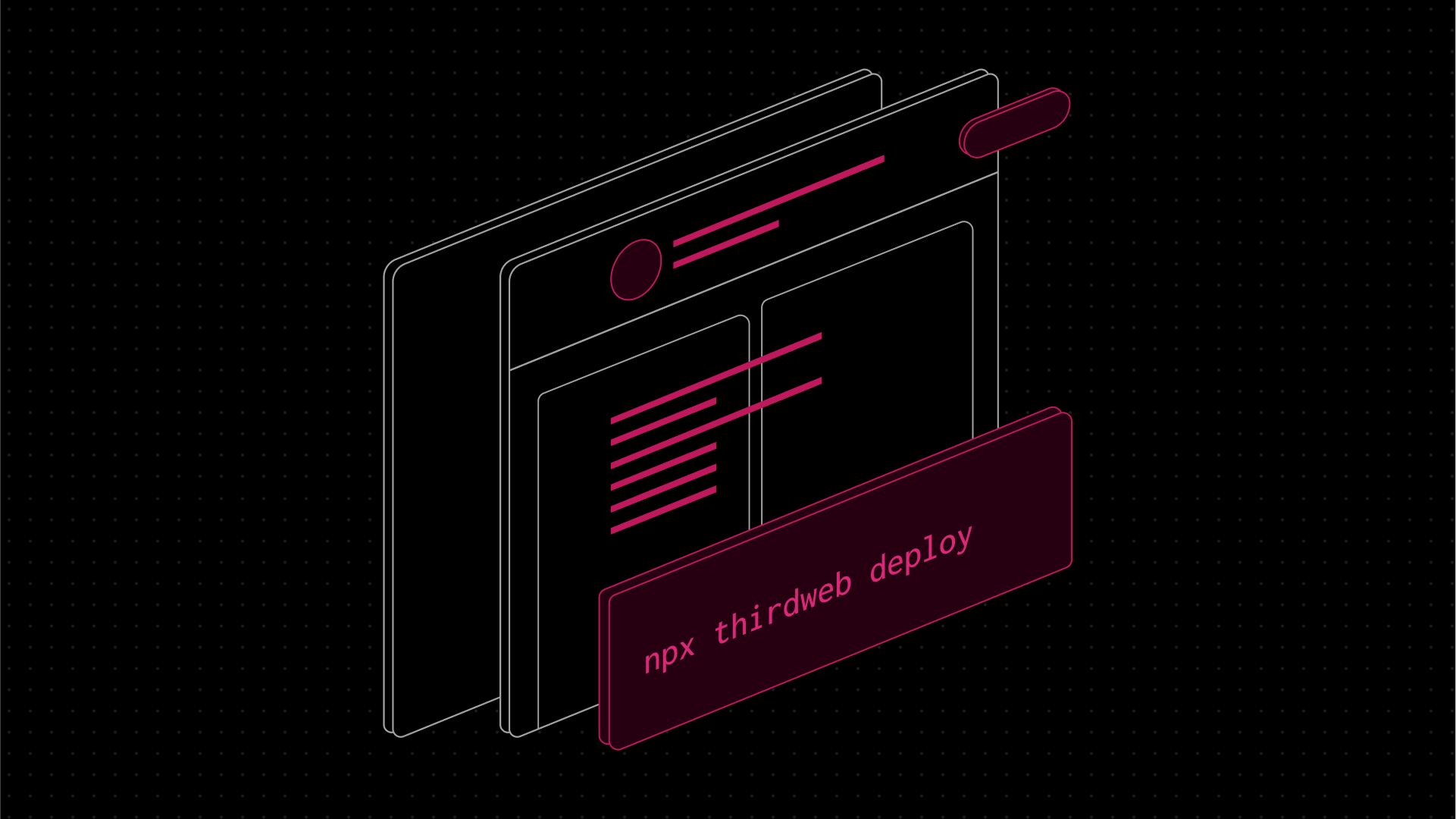
A DAO, which stands for Decentralized Autonomous Organization is an organization where decision-making power is distributed among all members, rather than centralized in a select few using blockchain technology. Instead of relying on a centralized entity (such as a company or CEO) for the decision-making, members participate through voting.
DAOs are extremely varied: they can be used to organize evolution of decentralized projects across multiple industries—powering changes in DeFi platforms, NFT membership clubs and much more. In future, they may even revolutionize traditional voting systems. And like most decentralized platforms, most DAOs rely on smart contracts.
But if you’re here, you likely already know about what a DAO is, you’re likely more interested in smart contract development for these types of organizations.
So without further ado, let’s dive into how you can launch a DAO; from the types of DAOs you can create, to writing and deploying the smart contracts themselves:
Why create a DAO smart contract?
There are lots of reasons to launch a DAO smart contract, but the main 2 are fairness, and user-driven changes.
To create a fair and transparent voting system for your organization
Traditional voting systems are hard to manage and have complex systems in place to avoid voter fraud—if they have any deterrent at all. But a DAO smart contact is deployed on the blockchain, which means that it’s practically impossible to forge. Plus, if the DAO smart contract is deployed on a public blockchain, it also means the voting mechanism is transparent: you can easily see how many people voted for each option using a blockchain explorer.
To implement user-driven changes on decentralized platforms
If you want to launch a decentralized platform, setting up a DAO can be one of the best ways to ensure its seamless operation over time and involve your community of users. For example, many DeFi platforms and decentralized metaverses implement voting mechanisms, allowing the most active users the most voting power on what happens to the platform.
The Anatomy of a DAO smart contract
Becoming a part of any organization requires commitment and involvement from its members. If there are no meaningful stakes, participants are unlikely to invest their time or energy. This is why DAOs use governance tokens to define and manage membership.
What is a Governance Token?
A governance token is typically implemented as an ERC20 token. Ownership of these tokens grants voting power in the DAO’s decision-making process. By holding these assets, members gain the ability to influence proposals and contribute to the organization’s direction. Additionally, the more significant the stakes—reflected by the number of tokens held—the greater the voting power and potential benefits.
Before you launch a DAO
The traditional DAO system doesn’t come without its challenges. Since voting power is tied to token ownership, individuals or entities with substantial funds can purchase large amounts of tokens, gain outsized influence in proposals, and then sell off their holdings once the vote concludes.
This power imbalance can undermine the DAO’s integrity; these participants may prioritize short-term gains over the long-term health of the organization. This system also gives bad actors the power to push harmful proposals without any real investment in the DAO or its community.
Skin in the Game
Another approach for DAOs, known as Skin in the Game, was proposed by Ethereum co-founder Vitalik Buterin. This system introduces a mechanism wherein the governance tokens are held as collateral. If a voter's decision leads to a negative outcome for the organization, the voter loses their collateral. This creates a direct financial consequence for poor decisions, ensuring voters have a vested interest in the DAO's success.
While this approach increases accountability, it isn’t perfect either. The distinction between "good" and "bad" outcomes is often subjective and can vary significantly depending on the organization’s goals and values. To address this, many DAOs establish a predefined set of rules that all members must agree to upon joining. These rules outline the organization’s principles and provide a framework for evaluating decisions, helping to reduce ambiguity in determining the consequences of specific actions.
How To Deploy a DAO Smart Contract
Creating a DAO smart contract system is not a one-size-fits-all process. Each DAO may have unique requirements and additional functionalities based on its specific goals.
However, two fundamental components are essential for any DAO: a Governance Token and a Voting System Contract. These provide the foundation for member participation in the decision-making process.
Here’s how to deploy the smart contracts you need:
How to launch a Governance Token Smart Contract
Deploying a governance token with thirdweb is a straight forward process. Let’s break down how to deploy a governance token smart contract for your DAO step-by-step:
Step 1: Login to thirdweb

Step 2: Open the dashboard, go to the contracts tab and hit on “Deploy contract”
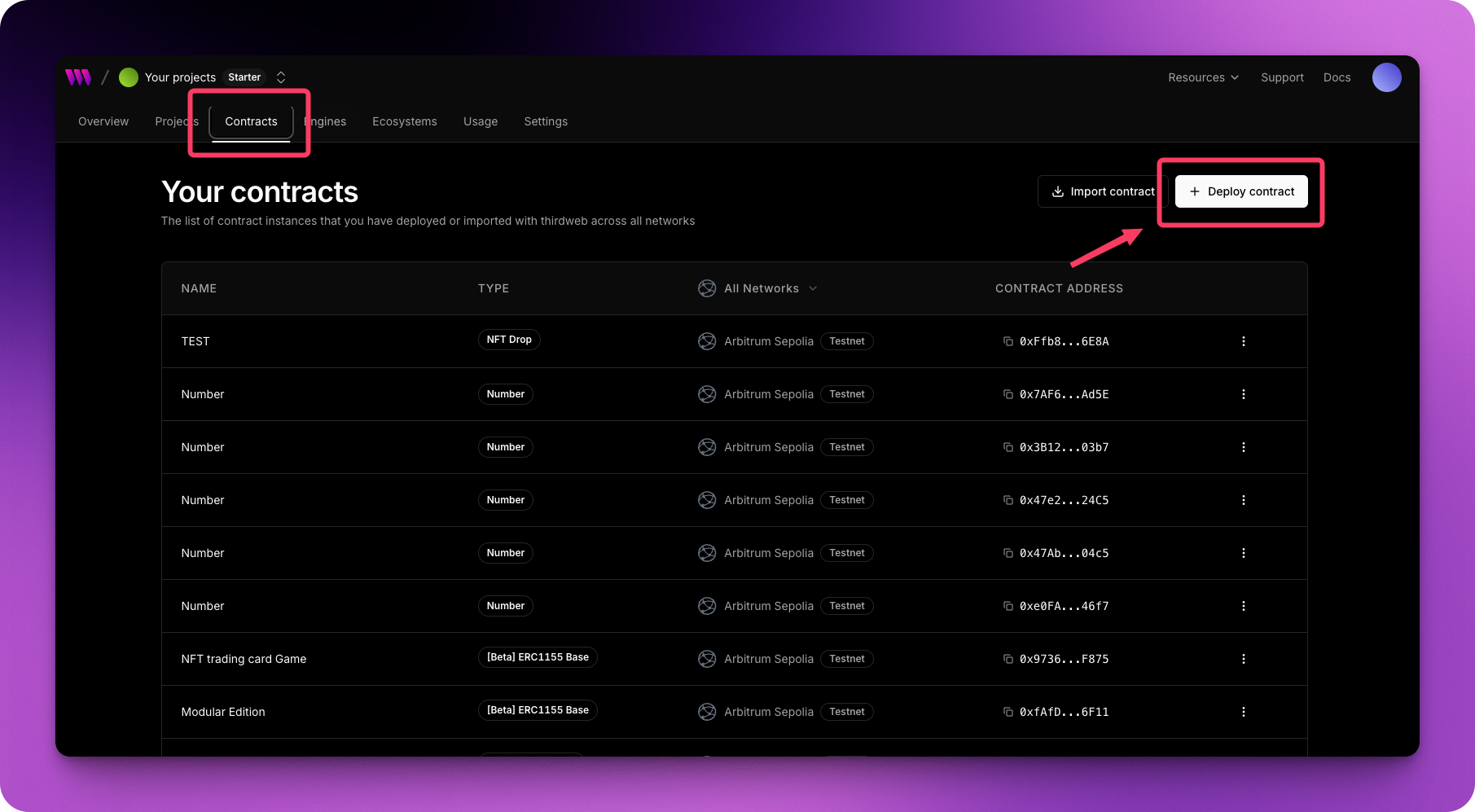
Step 3: Locate the DAOs and Governance section, select Token and click Deploy

Step 4: Setup the details of your Governance Token
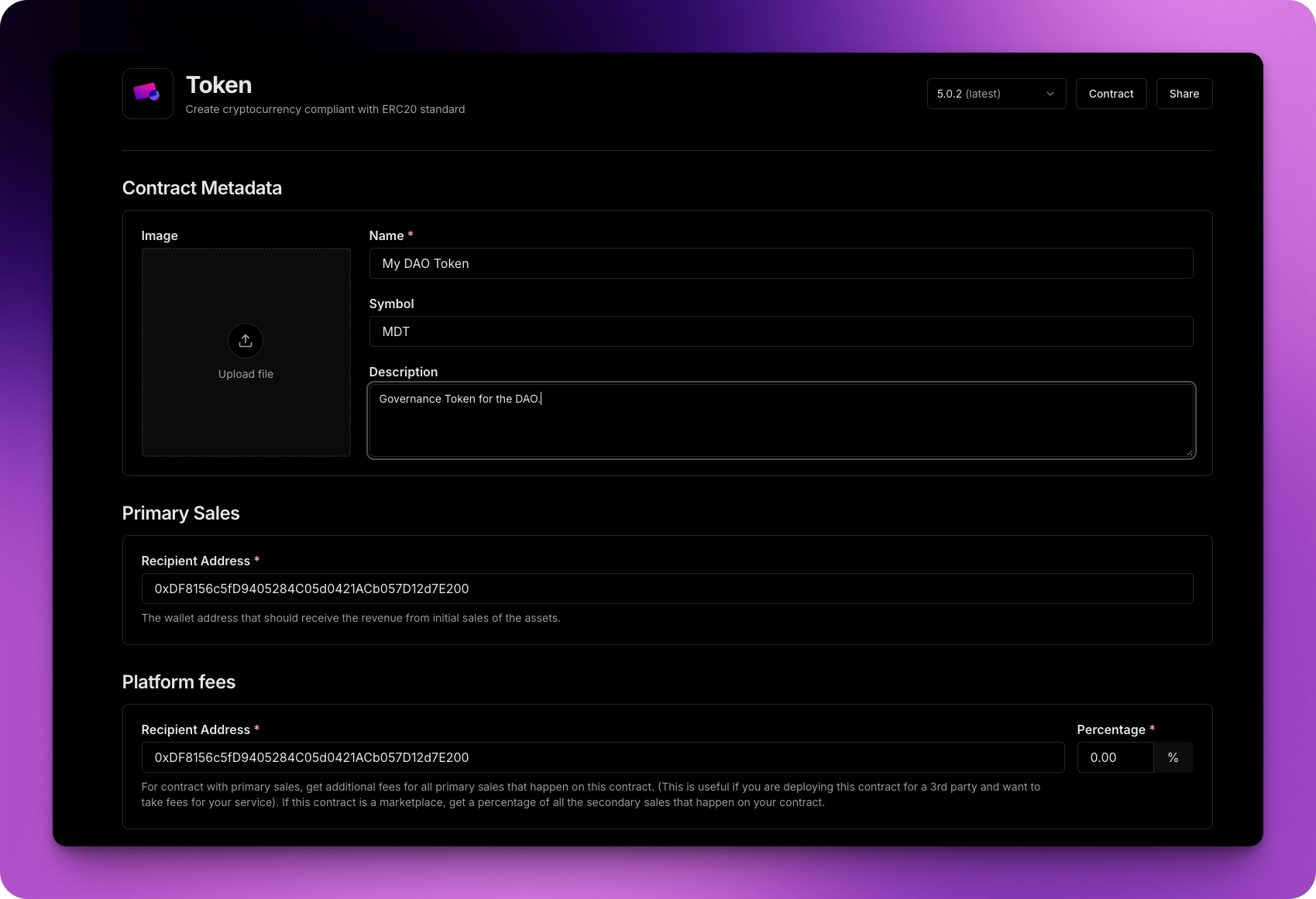
You need to specify:
- A token name.
- Symbol.
- Description.
- Primary sales address (by default is your wallet)
- Platform Fees.
- If you want to sponsor gasless transactions.
How to launch a Voting Smart Contract
The voting smart contract will handle the voting process. And deploying one via thirdweb is also a straight forward process.
Step 1: Repeat steps 1+2 but this time select “Vote”, and click deploy.

Step 2: Fill up the contract metadata
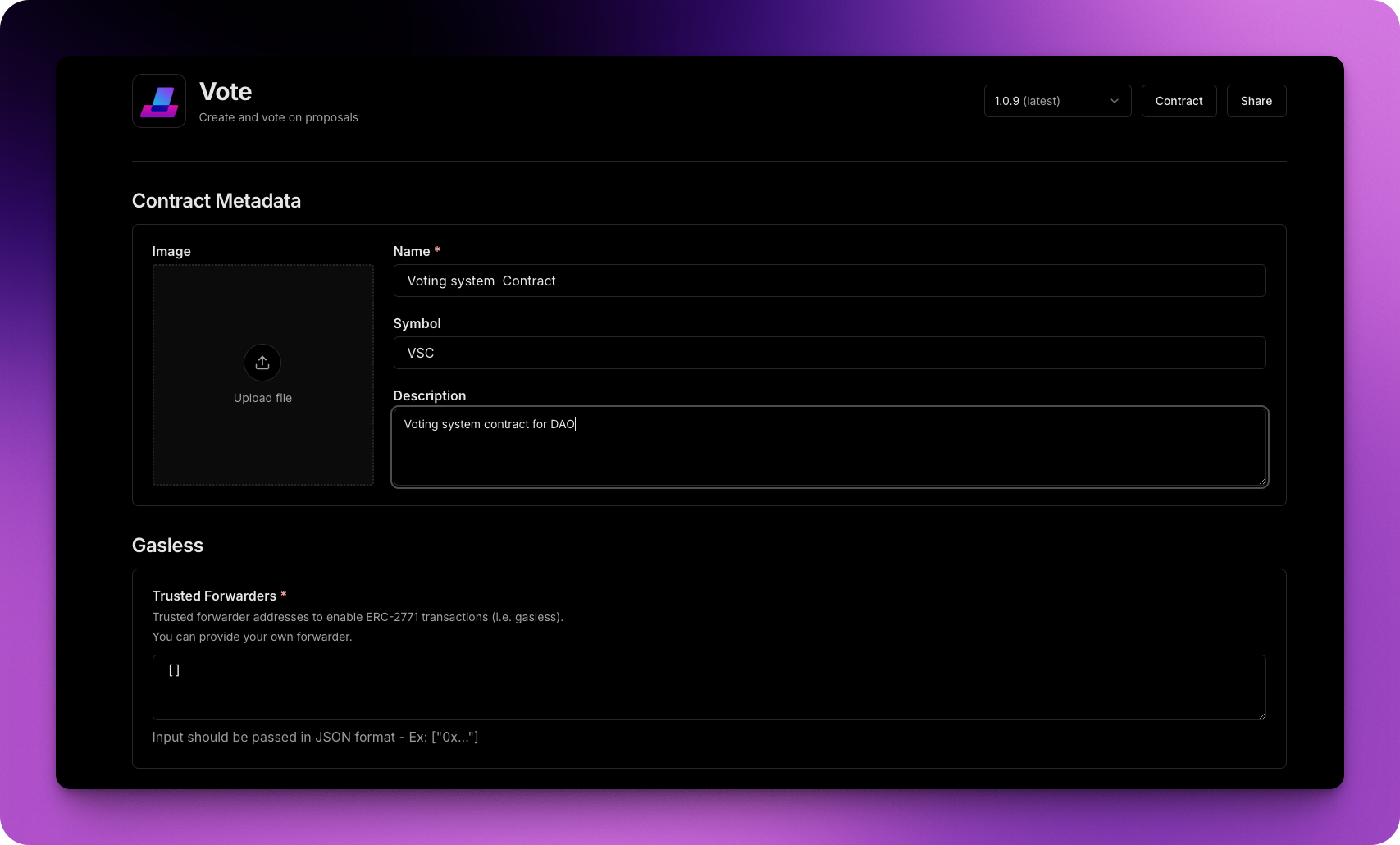
You can add the metadata in the same way you did with the Token Contact.
Step 3: Setup the Voting parameters for the DAO.
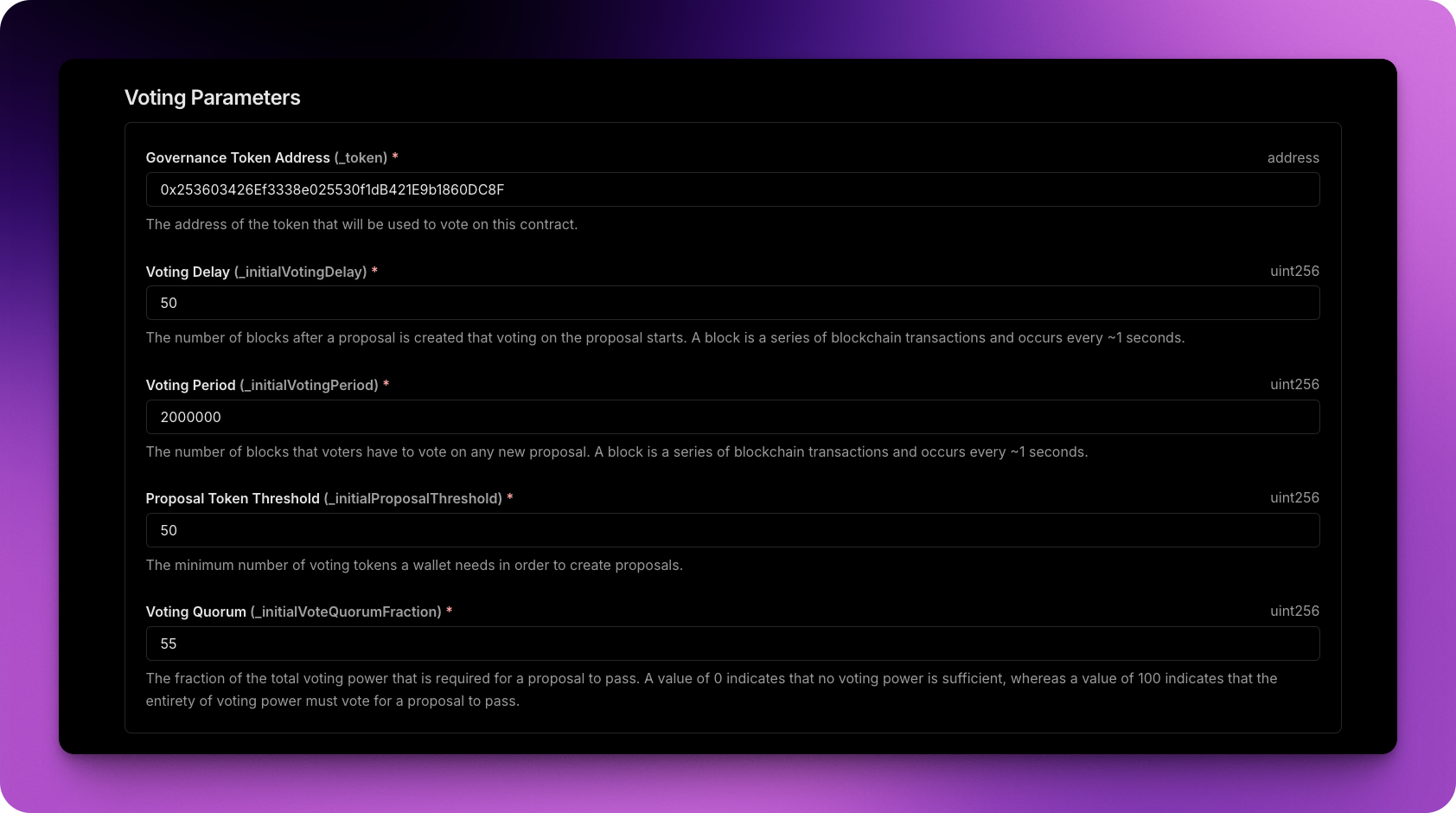
- Governance Token Address: is the token we just deployed, paste here the contract address.
- Voting Delay: The number of blocks after a proposal is created that voting on the proposal starts, the block time depends on the blockchain.
- Voting Period: The number of blocks that voters have to vote on any new proposal.
- Proposal Token Threshold: The minimum number of voting tokens a wallet needs in order to create proposals.
- Voting Quorum: The fraction of the total voting power that is required for a proposal to pass. A value of 0 indicates that no voting power is sufficient, whereas a value of 100 indicates that the entirety of voting power must vote for a proposal to pass.
Step 4: Select your preferred blockchain and Deploy

Make sure to use the same blockchain as the token contract!
And now it's time to congratulate yourself! Well done! You just launched a DAO!
Deploying a DAO Smart Contract: It’s simple with thirdweb
Decentralized Autonomous Organizations (DAOs) offer a fresh approach to structuring organizations, emphasizing fair rules and open discussions among all stakeholders and members. Decisions are made democratically, enabling participants to collaborate effectively toward shared goals.
Deploying smart contracts for a DAO can be a straightforward process using thirdweb dashboard. Simply deploy your smart contracts, access ready-to-use code snippets, and enjoy seamless integration into your application.
We hope this article has been insightful and helps you get started on your DAO journey. Happy coding!